Biden, Netanyahu To Discuss Saudi Normalization, Iran
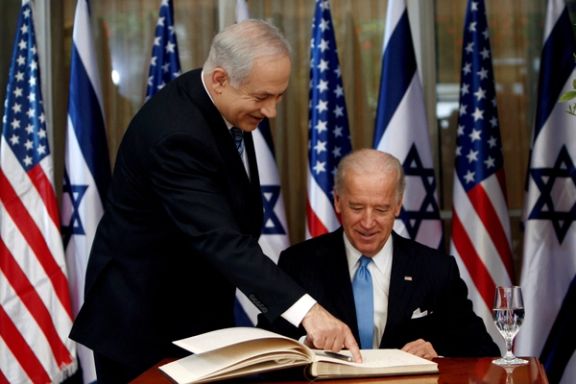
President Joe Biden and Israeli Prime Minister Benjamin Netanyahu on Wednesday will hold their first face-to-face talks since Netanyahu took power in December.

President Joe Biden and Israeli Prime Minister Benjamin Netanyahu on Wednesday will hold their first face-to-face talks since Netanyahu took power in December.
The topics expected to be discussed include a potential Israel-Saudi normalization deal and Iran.
Biden had held off extending an invitation to Netanyahu out of concern about a judicial overhaul that curbs the power of judges as well as Israel's expansion of settlements.
Instead of meeting at the White House - Netanyahu's preferred venue - the two leaders ended up arranging their talks on the sidelines of the UN General Assembly in New York.
US officials expect the judicial overhaul to come up in their conversations, as well as efforts to counter Iran's nuclear program and the possibility of what would be a major development - a normalization of Israel-Saudi relations.
The United States, Israel and Saudi Arabia have been discussing a potential deal in which the Israelis and the Saudis would normalize diplomatic relations and Washington and Riyadh would agree on a defense pact but talks still have far to go.
Observers believe the Saudi deal's enormous potential has left Biden & Netanyahu little choice but to meet despite differences.
The Biden administration is calculating that the US could reap big rewards from such a mega-deal if it can overcome steep obstacles.
"Many of the elements of a pathway to normalization are now on the table. We don't have a framework; we don't have the terms ready to be signed. There is still work to do," White House national security adviser Jake Sullivan told reporters on Sept. 7.
US officials have not ruled out an eventual White House meeting between Biden and Netanyahu.
Reporting by Reuters
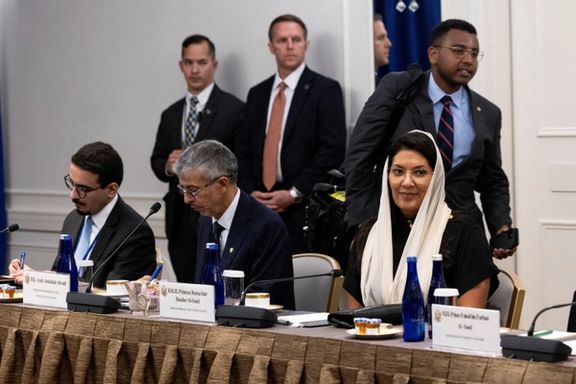
Gulf Cooperation Council (GCC) countries and the US renewed calls for Iran to fully cooperate with the International Atomic Energy Agency (IAEA), in a joint statement.
The statement came after a meeting of the GCC Arab foreign ministers, the US Secretary of State and GCC Secretary-General in New York.
Iran barred multiple International IAEA's inspectors assigned to oversee Tehran's atomic activities in a move described by the UN nuclear watchdog chief, Rafael Grossi, as "disproportionate and unprecedented."
Iran's move was a response to a call led by the United States, Britain, France and Germany at the IAEA's Board of Governors meeting last week for Tehran to cooperate immediately with the IAEA on issues including explaining uranium traces found at undeclared sites.
Despite talks since President Joe Biden assumed office, the United States has not been able to bring Tehran to agree to a new nuclear agreement, after former President Donald Trump left the JCPOA accord and imposed sanctions on Iran.
Iran’s controversial nuclear program that has been expanding at a faster pace since early 2021, is a source of great concern for its regional Arab neighbors. Tehran has long been projecting power throughout the Middle East and the Persian Gulf, arming and supporting militants and intimidating shipping in the strategic waters of the region.
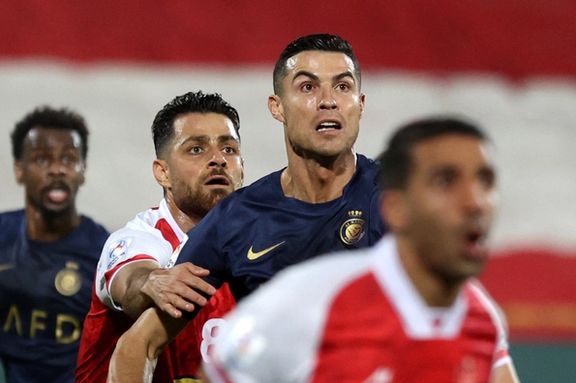
The Iranian regime had some luck on its side as a series of coincidences reduced the likelihood of larger protests on the anniversary of Mahsa Amini last weekend.
The scary Mahsa anniversary coincided with the 4th day of a long weekend many Iranians spent either at the Caspian seaside, or at other scenic places around Iran as the last opportunity for families to have a good time before the schools re-open on September 23.
Some social media users argued that activists and foreign-based opposition figures could have chosen and advertised another date closer to the actual anniversary. Some said that a September 23 event could have created havoc as the entire country usually turns into a big traffic jam.
Furthermore, the anniversary coincided with an embarrassing setback for Iran's national wrestling team during an international championship competition in Bulgaria. The Iranian team, historically one of the world's best since the 1950s, suffered a blow when its captain, Hassan Yazdani, lost to US Champion David Taylor. The outcome was filled with anger and tears within the Iranian team's camp.
Interestingly, in Iran, people celebrated the defeat. It was evident that they had little affection for Yazdani and his coach, both of whom were regime insiders who never supported the 2022 protests. The Islamic Republic undoubtedly appreciated the distraction.
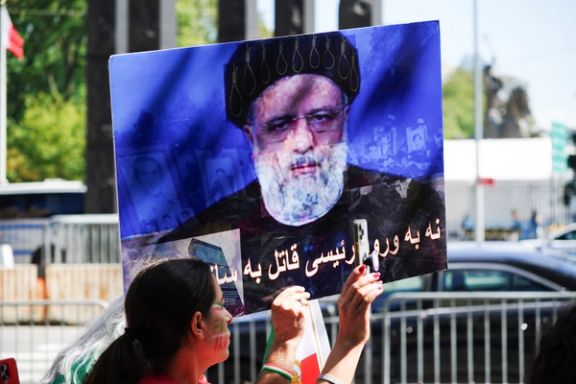
On Monday, a bigger distraction came from Saudi Arabia. Al-Nassr Football Club arrived in Iran for the Asian Football Clubs (AFC) Champions League competitions to face Iran's hugely popular leading football team Persepolis.
Thousands of Iranians were running around to follow the Saudi team and its internationally acclaimed star Cristiano Ronaldo across Tehran and almost occupied his hotel on the slopes of Mount Alborz. The hotel is located on top of a hill and fans climbed rocks to reach the hotel before the bus could drive around the winding road around the hill to make it to the top.
People came as far away as Isfahan. An elderly lady of Isfahan told reporters she travelled the long distance only to be able to judge Ronaldo's character, otherwise she knew very well that he was a good player. Her daughter told reporters what a staunch supporter her mother was.
A young boy was filmed crying outside the hotel because the crowed did not allow him to get as close to Ronaldo as he wished. Later, thanks to Al-Nassr's avid social media team, the boy and his grandfather were taken to Ronaldo's room. The athlete signed the jersey the boy was wearing as well as a new jersey. The boy is now thousands of dollars richer. His grandfather spent millions of rials to get a room for himself and his grandson at the same hotel with the Al-Nassr team.
A video surfaced on social media showing Ronaldo hugging a disabled woman who took the trouble to go and see him. A good publicity stunt, and again another victory for Al-Nassr, and its social media team.
Again, the distraction was a blessing for the Islamic Republic. Many Iranians lived in a parallel world for two days that did not care about insignificant news including the release of US hostages, the freeing of Iran's blocked assets, President Ebrahim Raisi's visit to New York where none of his entourage had an umbrella in the rainy afternoon and they had to borrow one for Raisi while tens of aides walked wet and tired under the afternoon shower.
The worst embarrassment, however, came at the airport, where Persepolis's manager presented two silk carpets to Ronaldo as gifts. The manager was harshly criticized by the press for the event as he has been hiding from the team members for weeks as he was unable to pay them. Later, he explained that the team had not paid for the carpets and that they were a gift from a major carpet seller. But no one in Iran believes such comments by officials.
The match on Tuesday, evening, if anyone is interested, ended two-nil for Saudi Arabia's Al-Nassr. Both goals were scored by Saudi players, not Ronaldo.
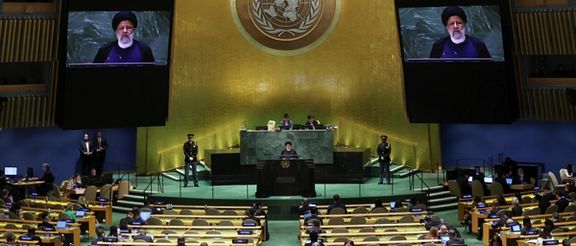
President Ebrahim Raisi blamed foreign countries for waging a propaganda campaign against the Islamic Republic in his UN General Assembly speech Tuesday.
He avoided the topic of the 2022 anti-regime protests almost entirely and referred to it only indirectly as the West’s worst media assault in history.
Raisi was speaking only a few days after the first anniversary of the killing of Mahsa Amini, which sparked widespread protests across Iran beginning in September 2022.
More than 500 were killed, 22 thousand arrested and at least 7 executed in the brutal crackdown that followed.
“The previous year was a year of victory for the Iranian people,” Raisi claimed brazenly, spinning last year’s events in Iran in the most spectacular fashion.
Images coming out of Iran last week, told a very different story: thousands of armed security forces and plain-clothes thugs had been stationed all over the capital Tehran, in anticipation of protests on the anniversary, intimidating passersby and preventing any gatherings in the streets.
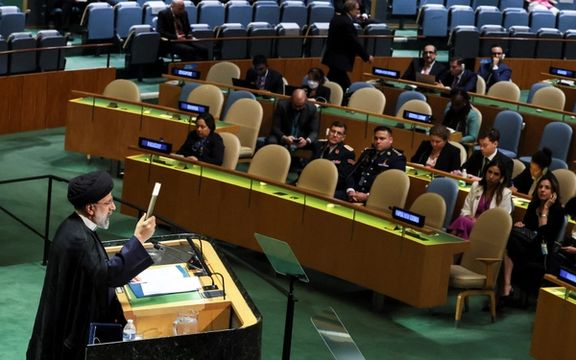
Raisi also lambasted the United States for ‘breaking a promise’ and leaving the JCPOA. He repeated the claim that Iran’s nuclear program is purely peaceful, despite accumulating well over 100 kilograms of uranium enriched to 60 percent.
"The Iranian nation prides itself on playing, thanks to the Islamic Revolution, the biggest role in unmasking the imperialists in the East and West," Raisi said, while the regime has supplied hundreds of kamikaze drones to Russia and exports more than million barrels of oil to China daily at discounted prices.
"The world is transitioning into a novel international order, and the project to Americanize the world has failed," he claimed.
Despite Iran's 12-year involvement in Syria's civil war and supply of weapons to Houthi forces in Yemen, Raisi said, “Our unambiguous position as the Islamic Republic: We do not stand nor support any war anywhere, not in Europe nor anywhere,”
On Monday, the UN nuclear chief said he had asked to meet Raisi on the sidelines of the General Assembly to try to reverse Iran’s decision to remove monitoring devices set up by IAEA and expel “a very sizable chunk” of the agency’s inspectors.
Rafael Grossi, Director of UN's International Atomic Energy Agency, warned that such measures make it impossible for IAEA to verify the nature of Iran's nuclear program.
Earlier on Tuesday, Iranian Americans opposed to the Islamic Republic held a rally ahead of Raisi’s appearance outside the UN headquarters in New York City.
The protesters had banners and posters portraying the Islamic regime's crimes in its 45-year history – including messages targeting Raisi and his role in those crimes.
Raisi was a member of the infamous Death Committee which oversaw summary execution of at least two thousand Iranian political prisoners in 1988.
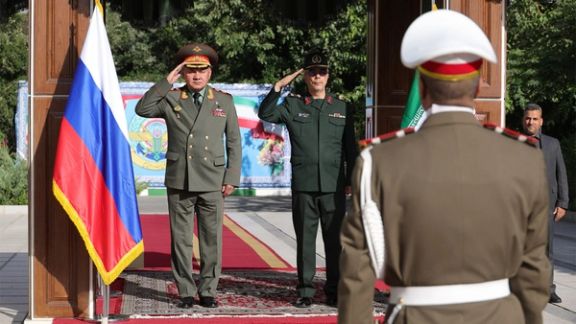
The defense minister of Russia arrived in Iran for a meeting with Iranian military officials, one day after the United States released $6 billion of Iran's frozen funds.
Sergei Shoigu led a delegation of military representatives from Russia during his visit on Tuesday.
Shoigu was invited by Major General Mohammad Bagheri, who serves as the Chairman of the Chiefs of Staff of the Iranian Armed Forces.
The visit coincided with the release of $6 billion frozen for five years in South Korean banks due to US sanctions. The Biden administration's decision to unblock the funds has faced criticism from Republicans, experts, and many Iranian Americans. Some critics have pointed out that the money will enable Iran to produce more weapons and pose a higher threat level.
The Islamic Republic has been a significant military supporter of Russia in its war on Ukraine. Since last July, both Kiev and US officials have repeatedly expressed concerns over Iran's military shipments to Moscow, including the supply of kamikaze drones.
Despite overwhelming physical evidence, Tehran has insisted that it does not supply weapons to Russia.
The United States, the United Kingdom, the European Union, Australia, and New Zealand have all implemented multiple rounds of sanctions against Iran for drone shipments to Russia.
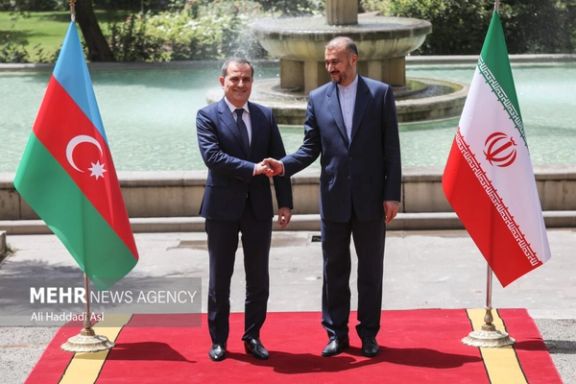
Iran's Foreign Minister and his Azerbaijani counterpart discussed recent developments in the Caucasus, amid Baku's renewed military action in Nagorno-Karabakh.
According to Iranian state media, Hossein Amir-Abdollahian and Jeyhun Bayramov had a telephone conversation on Tuesday.
During their conversation, they addressed the situation in Karabakh and the current conditions along the borders of Armenia and Azerbaijan. Iran has close ties with Armeina, which has a four-decade old conflict with Azerbaijan over Magorno-Karabakh, an Armeian-populated enclave inside Baku's international borders.
Azerbaijan shelled the region on Tuesday, a move that could potentially lead to a new conflict in this volatile area.
Baku justified its actions as necessary to restore constitutional order and remove Armenian military forces from the region. Karabakh is internationally recognized as Azerbaijani territory, but it is partially controlled by breakaway ethnic Armenian authorities who consider it their ancestral homeland. The region has been the focal point of two wars, the most recent in 2020, since the dissolution of the Soviet Union in 1991.
It remains uncertain whether Baku's actions will escalate into a full-scale conflict involving neighboring Armenia or if they will remain a more limited military operation.
The conflict has the potential to alter the geopolitical dynamics of the South Caucasus region, which is intersected by crucial oil and gas pipelines. Iran has previously cautioned against any changes to the political landscape of the Caucasus region and the adjustment of international borders.
Iran has declared that if either side seeks to alter the geopolitical situation in the Caucasus or international borders in the Karabakh region, it will abandon its neutral stance and respond directly.






